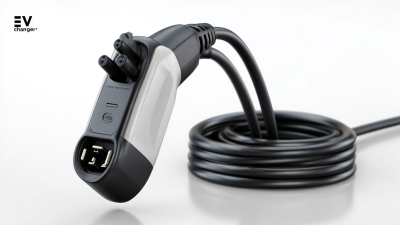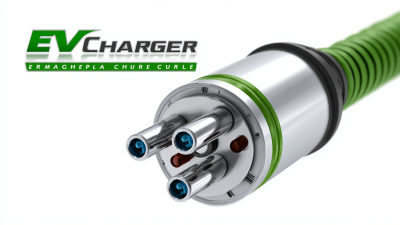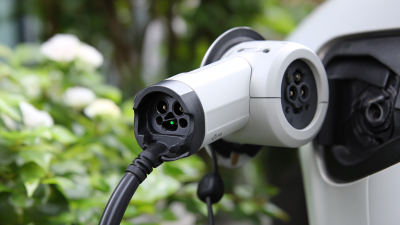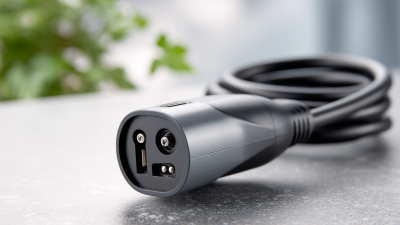In today’s rapidly evolving automotive landscape, the shift towards electric vehicles (EVs) is more prominent than ever. With the growing number of EVs on the road, the demand for effective charging solutions has surged, making the selection of the right EV Car Charger Adapter an essential decision for any EV owner. According to a recent report by the International Energy Agency, the global number of electric cars is expected to reach 125 million by 2030, which amplifies the need for comprehensive charging infrastructure and compatibility.
As stated by industry expert Dr. Emily Tran, "The right EV Car Charger Adapter can significantly improve the charging experience and ensure that drivers can efficiently power their vehicles no matter where they are." This sentiment underscores the importance of understanding the various types of adapters available and their compatibility with different vehicle models, power specifications, and charging speeds.

When selecting the right EV car charger adapter for your vehicle, it's essential to understand the various types available on the market. The two primary types of chargers are Level 1 and Level 2. Level 1 chargers utilize a standard household outlet, providing about 4-5 miles of range per hour of charging, making them suitable for overnight charging at home. In contrast, Level 2 chargers deliver a faster charge, offering approximately 25 miles of range per hour, which is more effective for frequent drivers or those in need of rapid charging solutions.
There is also an emerging technology known as DC fast charging, which can replenish an EV’s battery to 80% in about 30 minutes. According to the U.S. Department of Energy, the number of public DC fast charging stations has grown significantly, increasing from around 2,000 in 2015 to over 6,000 by 2021. This rapid expansion highlights the increasing demand for efficient charging options as more consumers transition to electric vehicles.
Tips: When choosing the right charger, consider your daily driving habits and the availability of charging stations in your area. It's also advisable to invest in a charger that is compatible with future EV models, ensuring longevity and flexibility in your charging infrastructure.
When choosing an EV car charger adapter for your vehicle, several key factors come into play. First and foremost, compatibility with your electric vehicle is crucial. Different vehicles use various connector types, such as Type 1, Type 2, or CCS. Ensuring that the charger adapter matches your vehicle's specifications will save you from purchasing an unsuitable product and enhance charging efficiency.
Another important consideration is charging speed. Not all adapters provide the same power output, so it's essential to assess the adapter's amperage and voltage ratings. Higher-rated adapters can significantly reduce charging time, making them an ideal choice for those who are often on the go. Additionally, consider the installation and portability of the adapter. A user-friendly design that allows for easy installation and transportation can enhance your overall charging experience, enabling you to charge your EV conveniently whether at home or on the road.
When selecting an EV car charger adapter, focusing on the key features can significantly enhance your charging experience. One of the most crucial aspects to consider is compatibility. Ensure that the adapter matches your vehicle’s charging port type—whether it be J1772 for most mainstream electric vehicles or CCS for rapid charging options. This compatibility will not only provide the right fit but also optimize the charging efficiency.
Another important feature to look for is charging speed. Different adapters support various power levels, measured in kilowatts (kW). For example, Level 2 chargers generally offer faster charging times compared to Level 1. Thus, if you frequently need to charge your vehicle quickly, opting for a high-capacity adapter can save you valuable time. Additionally, it's beneficial to select adapters with smart features such as app connectivity, allowing you to track charging progress and manage settings remotely, further enhancing your EV charging convenience.
When it comes to owning an electric vehicle (EV), choosing the right charging adapter is crucial for maximizing efficiency and convenience. This guide will compare the best 10 EV charger adapters available on the market, highlighting their features and benefits. From high-speed charging solutions to compact portability, each adapter offers something unique to cater to different needs and vehicle types. For instance, the NEMA 14-50 adapter is ideal for those looking for faster home charging, while portable options like the Duosida adapter are perfect for on-the-go charging situations.
Additionally, factors such as compatibility with various EV models, durability, and safety features are essential when selecting an adapter. The ClipperCreek HCS-40, for example, is renowned for its robust build and user-friendly interface, making it a favorite among EV owners. On the other hand, adapters like the Tesla Wall Connector provide seamless integration for Tesla drivers, ensuring they have the fastest charging experience. By evaluating these options based on performance, user reviews, and pricing, EV owners can make informed decisions that best suit their charging requirements.
When it comes to installing and maintaining your EV charger adapter, proper planning and execution are key to ensuring optimal performance.
First, ensure that your installation area is accessible and complies with local electrical codes. Hiring a certified electrician can help guarantee that the installation is done safely and correctly.
Additionally, consider the proximity of your charger to your vehicle’s parking spot, as well as the power supply available in your home. This careful planning can prevent future complications and improve charging efficiency.
Regular maintenance of your EV charger adapter is crucial for longevity and reliability. Keep the unit clean and free from debris by periodically wiping it down with a damp cloth.
Inspect the connectors for any signs of wear or damage, as these can affect charging performance. If you notice any issues, such as unusual noises or inconsistent charging speeds, it’s advisable to consult the manufacturer or a professional technician.
Following these maintenance tips will help you enjoy seamless charging experiences and extend the life of your EV charger adapter.














